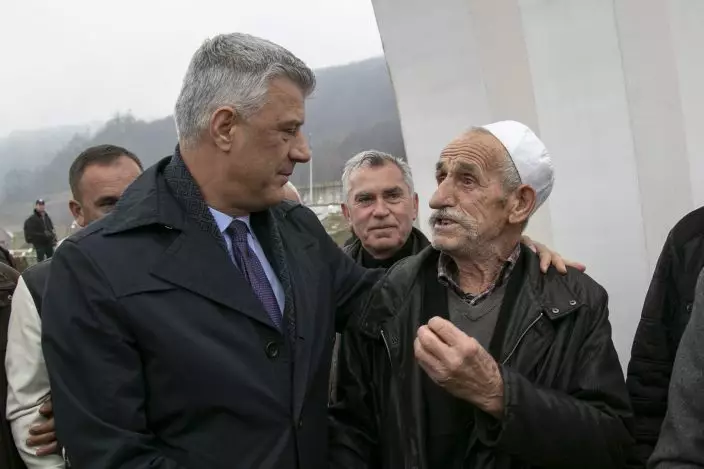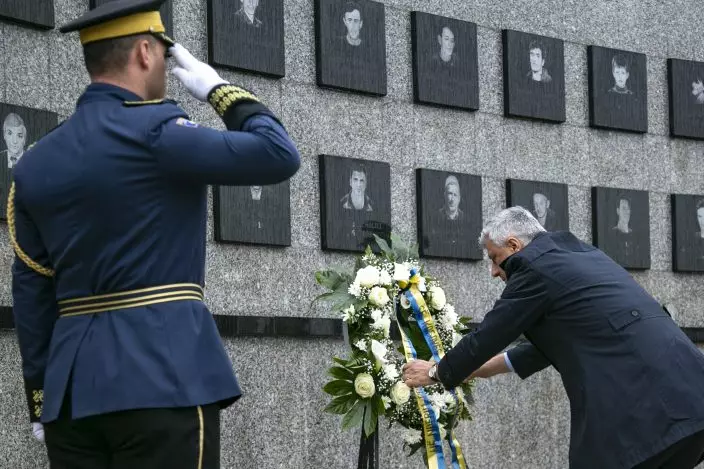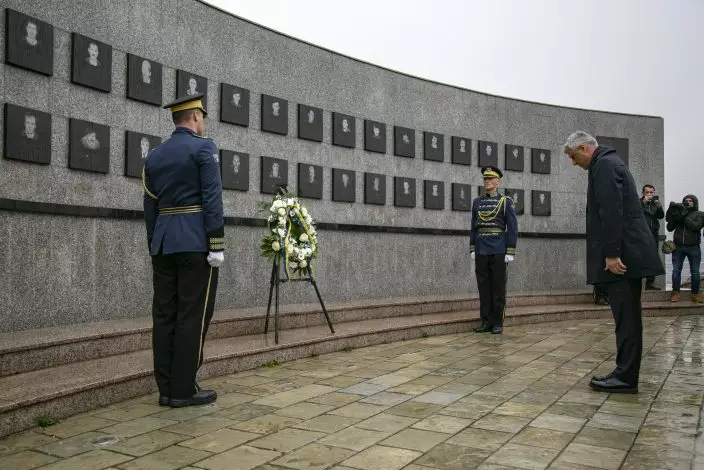Kosovo's president on Tuesday called on Serbia to apologize for what he says were “crimes against humanity” committed during a conflict two decades ago as a condition for a peaceful bilateral relationship.
President Hashim Thaci was visiting the southern village of Recak, 32 kilometres (20 miles) south of the capital, Pristina, to mark international Human Rights Day.
Recak is where 45 ethnic Albanians were slain by Serb forces in a mass killing in 1999, a move that served as a major factor in NATO's decision to launch an air campaign against Serbia to end the 1998-99 war.

Kosovo president Hashim Thaci, comforts Hafiz Musafaj, during his visit to the Recak memorial, in the village of Recak on Tuesday, Dec. 10, 2019, where he called on Serbia to apologize for the genocide on his country as the first step toward a peaceful future relationship. Thaci, a former commander of the Kosovo Liberation Army independence fighters, or KLA, said that during its genocide campaign in 1998-1999 Serbia committed some 400 massacres, killing about 13,000 civilians, including 1,300 children. Some 1,650 are still unaccounted for. (AP PhotoVisar Kryeziu)
“Recak marks the culminate point of the massacres and the crimes against humanity committed from the Serb state against Kosovo,” said Thaci, a former commander of the forces behind Kosovo's struggle for independence.
The Serbian government at the time said the dead were all rebel Kosovo Liberation Army members killed in combat with state security forces. Serbia still maintains that claims of a massacre at Recak are fabricated.
Thaci told Serbia that “the future is built only when the Serb leadership acknowledges the accountability and apologizes for the crimes committed in Kosovo.”

Kosovo president Hashim Thaci, right, visits the graves at the Recak cemetery on Tuesday, Dec. 10, 2019 where he called on Serbia to apologize for the genocide on his country as the first step toward a peaceful future relationship. Thaci, a former commander of the Kosovo Liberation Army independence fighters, or KLA, said that during its genocide campaign in 1998-1999 Serbia committed some 400 massacres, killing about 13,000 civilians, including 1,300 children. Some 1,650 are still unaccounted for. (AP PhotoVisar Kryeziu)
Pristina-Belgrade relations are still tense despite the eight-year EU-facilitated talks to normalize their ties, which have stalled after Kosovo’s 100% tariff on Serb goods after accusing Serbia of creating obstacles for recognition and membership in international organizations.
The U.S. Embassy issued a statement Saturday, urging “Kosovo and Serbia to return to the table and refocus their energies on the future by normalizing relations.”
A Serb government crackdown on Kosovo's separatist ethnic Albanians in 1998-99 killed some 10,000 people. A 78-day NATO air campaign ended Serb rule in Kosovo, and the U.N. governed the province until 2008 when Kosovo declared independence from Serbia, which Belgrade hasn't recognized.

Kosovo Security Force member salutes at the Recak memorial as Kosovo president Hashim Thaci lays a wreath on Tuesday, Dec. 10, 2019 where he called on Serbia to apologize for the genocide on his country as the first step toward a peaceful future relationship. Thaci, a former commander of the Kosovo Liberation Army independence fighters, or KLA, said that during its genocide campaign in 1998-1999 Serbia committed some 400 massacres, killing about 13,000 civilians, including 1,300 children. Some 1,650 are still unaccounted for. (AP PhotoVisar Kryeziu)

Kosovo Security Force members stand guard at the Recak memorial as Kosovo president Hashim Thaci pays respect on Tuesday, Dec. 10, 2019, where he called on Serbia to apologize for the genocide on his country as the first step toward a peaceful future relationship. Thaci, a former commander of the Kosovo Liberation Army independence fighters, or KLA, said that during its genocide campaign in 1998-1999 Serbia committed some 400 massacres, killing about 13,000 civilians, including 1,300 children. Some 1,650 are still unaccounted for. (AP PhotoVisar Kryeziu)


